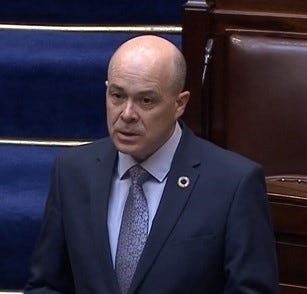Government's Spring Legislative Programme: Key Highlights
Two weeks ago the Government published its spring legislative programme. While much of the focus is on what legislation is to be published between now and Easter, I think what is more interesting is some of the legislation likely to go before the Oireachtas Committees for pre-legislative scrutiny hearings, which ties in with some interesting commitments in the Programme for Government.
Digitisation and Public Services
Throughout the Programme for Government, there is a commitment to support digitisation, particularly of public services “through enhanced digital platforms”. A critical piece of legislation to facilitate this objective, and for the whole digital economy, is the Gigabit Infrastructure Bill, which will enact the EU Gigabit Infrastructure Act (GIA). The GIA aims to support the faster and more cost-effective deployment of very-high-capacity networks (VHCNs) or gigabit networks. This is an interesting piece of legislation as it is likely to build on some of the outputs from the Mobile Phone & Broadband Taskforce, which I established as Minister in 2016. It might sound surprising, but this taskforce was a groundbreaking initiative in Ireland, by bringing all the public and private sector players around one table for the first time to speed up the deployment of telecommunications networks.
Artificial Intelligence and Cyber Security
Another EU law that the Government plans to bring before the Oireachtas Committee for input this year is the Regulation of Artificial Intelligence Bill, implementing the EU’s Artificial Intelligence Act. It will be interesting to see what input is made by industry to this proposed legislation and, more importantly, the political response to such submissions.
This will all be backed up with the new National Cyber Security Bill, which will establish the National Cyber Security Centre on a statutory basis. During these hearings, we should get more detail from the Government on its plan for a Cyber Security Centre of Excellence which is to be based around a cluster of third-level education facilities.
Health Sector Innovations
But it’s not just the telecoms and software development sectors that will be rushing into Leinster House. The new Government has made a big play on launching “a digital transformation in health”. While there is no doubt who will be the key players when it comes to the Health (Pharmacy and Prescribing) Bill, which is planned to update provisions of the Pharmacy Act to facilitate the long-awaited national system for electronic prescribing, this legislation will also update the Irish Medicines Board Act to support the Government’s eHealth strategy. With the launch of the HSE's new patient help app, “giving patients easier access to their health information”, this has huge potential to improve the efficiency and timely delivery of health services throughout the country. As a result, I would expect to see many of the global health technology players taking a keen interest in this draft law, particularly as the national broadband plan completes the delivery of fibre optic cable to rural homes by the end of next year.
We will also see many of the pharmaceutical companies come before the Oireachtas Health Committee to make the case for access to new medicines and treatments as part of the hearings on the draft Health (Pharmacy and Prescribing) Bill. They will be back again with the planned new National Research Ethics Committees (NREC) Bill, which will help to streamline clinical trials in Ireland, helping the Government to fulfil its commitment to “increase the number of clinical trials” that Irish patients can access, which will be particularly welcome for patients with cancer and rare diseases.
National Clustering Programme
What really makes all of this interesting is the Government’s National Clustering Programme which ties in neatly with IDA Ireland’s new 5 year strategy. This programme envisages the clustering of companies, third level institutions and public sector bodies. This will come into focus with the committee hearings around the draft Industrial Development (Miscellaneous Provisions) Bill, which will facilitate IDA Ireland in establishing jointly owned Designated Activity Companies (DACs) to develop industrial and commercial property and infrastructure.
Not only will we have industry representatives and third-level institutions, but I suspect we will also have regional bodies and maybe even a chamber of commerce or two making a pitch as to why one of the five newly planned clusters should be located close to their town or city.
Pre-Legislative Scrutiny
What really makes this planned legislation so interesting is that it is not just the Government that will drive the content of these new laws. TDs and Senators now have a key role to play with the Pre-Legislative Scrutiny (PLS) process, which gives stakeholders and the public a far greater role in how these laws will be drafted.
It will be interesting to see if either the academic community or the public will take an interest in how these laws should be drafted and what direction they should take, or will it all be left to the traditional stakeholders.
Watch this space!




